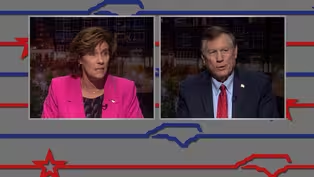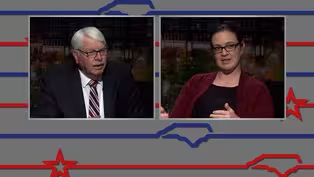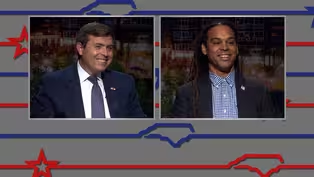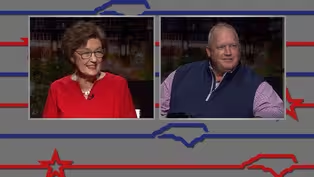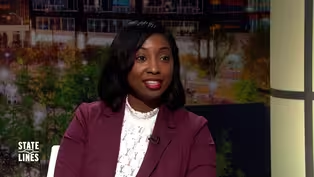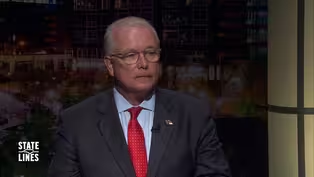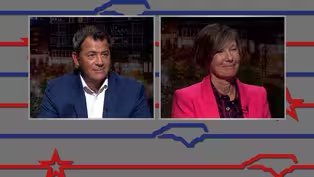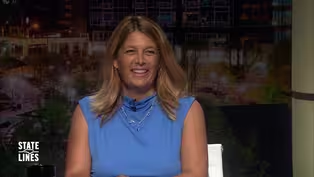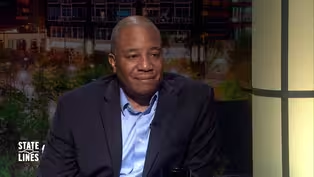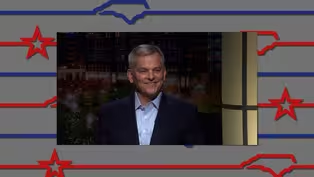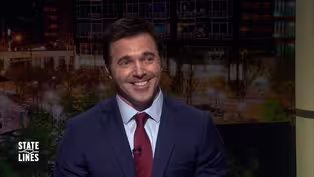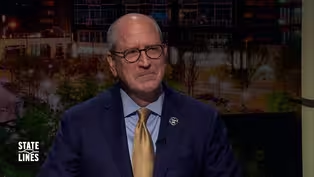
2024 NC Treasurer Candidates
Special | 26m 46sVideo has Closed Captions
Wesley Harris (D) and Brad Briner (R) discuss their campaigns for NC Treasurer.
Candidates Wesley Harris (Democrat) and Brad Briner (Republican) discuss their campaigns for NC Treasurer. Hosted by PBS NC’s Kelly McCullen, these interviews were recorded on July 25 and July 31, 2024.
Problems playing video? | Closed Captioning Feedback
Problems playing video? | Closed Captioning Feedback
State Lines is a local public television program presented by PBS NC

2024 NC Treasurer Candidates
Special | 26m 46sVideo has Closed Captions
Candidates Wesley Harris (Democrat) and Brad Briner (Republican) discuss their campaigns for NC Treasurer. Hosted by PBS NC’s Kelly McCullen, these interviews were recorded on July 25 and July 31, 2024.
Problems playing video? | Closed Captioning Feedback
How to Watch State Lines
State Lines is available to stream on pbs.org and the free PBS App, available on iPhone, Apple TV, Android TV, Android smartphones, Amazon Fire TV, Amazon Fire Tablet, Roku, Samsung Smart TV, and Vizio.
Providing Support for PBS.org
Learn Moreabout PBS online sponsorshipMore from This Collection
During major election cycles, PBS North Carolina's public affairs team sits down for in-depth conversations with candidates running for Governor and Council of State positions. PBS North Carolina has invited major party candidates to a one-on-one interview with State Lines host and executive producer Kelly McCullen. Interviews are scheduled throughout the summer.
2024 NC Commissioner of Insurance Candidates
Video has Closed Captions
Mike Causey (R) and Natasha Marcus (D) discuss their campaigns for NC Commissioner of Insurance. (26m 46s)
2024 NC Commissioner of Agriculture Candidates
Video has Closed Captions
Sarah Taber (D) and Steve Troxler (R) discuss their campaigns for NC Commissioner of Agriculture. (26m 46s)
2024 NC Commissioner of Labor Candidates
Video has Closed Captions
Luke Farley (R) and Braxton Winston II (D) discuss their campaigns for NC Commissioner of Labor. (26m 46s)
2024 NC Secretary of State Candidates
Video has Closed Captions
Elaine Marshall (D) and Chad Brown (R) discuss their campaigns for NC Secretary of State. (26m 46s)
Jessica Holmes, Democratic Candidate for NC Auditor
Video has Closed Captions
An interview with Jessica Holmes, Democratic candidate for NC Auditor (2024). (12m 32s)
Dave Boliek, Republican Candidate for NC Auditor
Video has Closed Captions
An interview with Dave Boliek, Republican candidate for NC Auditor (2024). (12m 58s)
2024 NC Lieutenant Governor Candidates
Video has Closed Captions
Hal Weatherman (R) and Rachel Hunt (D) discuss their campaigns for NC Lieutenant Governor. (26m 46s)
Michele Morrow, Republican Candidate for NC Superintendent of Public Instruction
Video has Closed Captions
An interview with Michele Morrow, GOP candidate for NC Superintendent of Public Instruction (2024). (12m 57s)
Maurice "Mo" Green, Democratic Candidate for NC Superintendent of Public Instruction
Video has Closed Captions
An interview with Mo Green, Democratic candidate for NC Superintendent of Public Instruction (2024). (13m 7s)
Video has Closed Captions
Josh Stein (D) discusses his campaign for NC Governor. (26m 46s)
Jeff Jackson, Democratic Candidate for NC Attorney General
Video has Closed Captions
An interview with Jeff Jackson, Democratic candidate for NC Attorney General (2024). (12m 50s)
Dan Bishop, Republican Candidate for NC Attorney General
Video has Closed Captions
An interview with Dan Bishop, Republican candidate for NC Attorney General (2024). (12m 44s)
Providing Support for PBS.org
Learn Moreabout PBS online sponsorship- Meet the Republican and Democratic nominees for North Carolina treasurer on the special Election 2024 edition of "State Lines."
[grand music] Hello there, I'm Kelly McCullen.
This "State Lines" special will introduce us to the candidates for North Carolina Treasurer, which is an open race in 2024 since the incumbent, Dale Folwell, did not seek reelection.
Joining us for the first discussion is Democratic nominee for treasurer Wesley Harris.
Mr. Harris, thanks for coming onto the set.
Good to see you.
- Yeah, thank you for having me.
It's great to be here.
- Well, first things first, you're running a statewide campaign when very few voters, statistically, sadly, don't pay attention to Council of State, but they have a choice and you're the Democratic nominee.
Who are you and why do you want to be the treasurer?
- Yeah, so my name's Wesley Harris.
I am the Democratic nominee for state treasurer.
So I'm a native North Carolinian, was born and raised in Alexander and Iredell County, in the northwestern part of the state.
My dad was a local banker, my mom was a public school teacher.
So I like to tell people, put a banker and a state employee together and that's pretty much the treasurer's race.
I currently serve my third term in the state legislature, I represent in South Charlotte.
We flipped the seat back in 2018 and I'm actually the only PhD economist in the entire legislature.
And so I've been the lead Democrat on every finance and economic issue since I've since taken office in 2019.
And so, you know, the state's finances are of critical importance to me and so many people in North Carolina.
And so I'm running for state treasurer to make sure that we actually invest in our people so that we can continue to not only grow our state, but that can live up to all of its potential.
- So how are the state's finances right now?
And particularly health plan and state pensions since that's the job you want's running that.
- They're a little dicey.
You know, we have on the pension plan good news, bad news.
Good news is it's one of the best-funded pension plans in the entire country.
I think almost 85% of our pension plan is actually funded.
Bad news is, is that it has been one of the worst-performing pension plans of the past seven to eight years, ranked 50 out of 50 in the country.
And so we have to do better in getting the returns that we need 'cause if you look at why we can't give cost-of-living-adjustment raises to our retirees, it's because our pension plan has not performed the way it needs to.
And on the state health plan side, again, the legislature is not raising wages the way they need to and paying our state employees they need to.
And so our stock of state employees, is they're getting older and they're getting sicker coupled with hospital consolidation and pharmaceutical prices outrageously rising, it's a challenge.
And so we have to have a lot of work ahead of us to make sure that we can not only provide the healthcare that our state employees needed, but that we can make it sustainable.
- Let's go back to that pension plan.
You say it rated at the bottom or near the bottom for return on investment.
Why did that happen and how do you avoid that?
- It's an asset allocation problem.
You know, we have 14% of our $120 billion pension plan sitting in cash and that's getting zero returns.
It's actually getting negative returns because we have inflation going on here.
And so we could take a fraction of that and invest it just in index funds, just a conservative investment strategy.
And over the last six years we could see almost $10 billion extra into our pension plan.
And so we just have to invest that money.
You know, most other pension plans have their cash balance around 2%.
We have it at 14%, so that is well over $10 billion that's just sitting there in cash.
And the money that's being invested is actually performing quite well, about the same as the market.
But we just have way too much of our pension plan simply sitting in cash.
- This race is interesting to me because a Republican in Dale Folwell earned an endorsement of an association that if in the past that people would always assume would always endorse a Democrat 'cause this a workers' association, SEANC.
But how partisan is this job really in practice?
I mean, both of you in this race, the major party candidates have great resumes and know how to invest money.
So how do we go between, how do we know it's you versus the other person?
- Sure, and that's, you know, one of my favorite things about public finance is that it's more of a math problem than it is a politics problem.
And you know, people should vote for me because I actually believe in investing in our state employees.
Like you said, I'm honored to be the first treasurer's candidate actually since 2008, to have the endorsement of both the State Employees Association and the North Carolina Association of Educators.
And so, you know, we wanna do right by our state employees because we want to fully fund our state employees.
I like to say you can't have a government that works for everybody if you don't have a government people are willing to work for and they're not gonna be willing to work for you unless you have great benefits.
And I think the biggest difference between us is actually I want to maintain the independence of the Treasurer's Office and the sole fiduciary while my opponent is actually proposing a constitutional amendment shifting that power to a committee, which in North Carolina, you're giving it to the Legislature and there is one thing our Legislature does not need and that's more power, particularly over our pension plan so that they can appoint it with political appointees and have politicization of our pension plan where we really just need to make sure that we're making good investments that benefit our people.
And that is what I'm committed to do.
- For this campaign, in regard to the sole fiduciary where the treasurer has absolute authority to invest funds how he or she sees fit, the argument is one person can be corrupted and it happens in other states, but a committee of experts, much more difficult, much more stable from good governments.
Your take?
- My take is it's about accountability.
You know, this is a position that is elected by the people.
You know, not every treasurer is elected by the people.
And so the people get the say.
And that is something that I hold near and dear that's, you know, the backbone of our democracy and one person can be corrupted, so can a group of political appointees.
We have seen that with our UNC Board of Trustees that has done a terrible job politicizing the crown jewel of our economic development system, our UNC system.
And so I wanna keep the power of the office with the people so that they can hold those elected officials accountable, not rely on gerrymandered maps and political appointees.
- Hey, took a shot at UNC there.
I wanna ask you how forward-facing should this position be?
And if you're elected treasurer, or any treasurer in the future, how loud should they be in public discourse?
- I think they should be loud enough to let people know what's going on.
You know, I as one of the chief financial officers of the state, I think it's imperative that this position as a council state member goes around the state and tells people what's going on with the state's finances.
Because I think it is an area where people don't necessarily know what's going on.
It's, you know, not the sexiest of topics, but people need to know what's happening to our state's finances.
The fact that in 2019 we had an $18 billion in debt capacity and that has fallen to $8 billion where our public school capital needs have risen from $8 billion in 2019 to over $13 billion.
And the fact that we have not made those investments and we have squandered so many financial opportunities over the past six to seven years, people need to know about that so that they can hold their elected officials accountable.
And as a financial role, I think it is a critical responsibility of the treasurer to make sure people know what's happening in our state.
- It's understandable, you need to be loyal opposition to a Republican super majority, at least as it is as we do this interview.
But if you poke too hard, you prod too hard, you go after 'em too hard, you still need to work with 'em 'cause they won't give you anything if you can't charm them in some way.
- Absolutely.
- So where can you be most effective and still, you know, be Wesley Harris, Democrat treasurer?
- Yeah, well you know, this is my third term in the legislature, so I'm quite comfortable with, I have good relationship with most Republican legislatures in the building.
Like I said, being a finance person, the math is nonpartisan.
The math is the math.
And so you can really bridge bridges there and make connections there.
And so, but you have to hold people accountable and I think that's the biggest challenge of any political job, particularly in a purple state like North Carolina where you have a legislature that typically leans Republican and Council of State or statewide offices like the governor that typically lean democratic.
And so finding those compromises where you can is critical, but you also gotta stand up for what your values are and make sure that you're doing what you can to hold the other elected officials accountable.
- Treasurer Folwell, in his two terms as treasurer, went directly after the state's investment in these private equity funds that may have high returns, but they have very high fees and he attacked fees to bring those down to save retirees money was the logic I remember him having on the campaign trail.
What is your opinion of going for the higher returns, even if it costs higher fees as compared to low fees, low return on investment.
- It's a balance between risk and reward in the sense that- - Are you against that?
Are you against the private, the hedge fund type work - In a lot of sense, yes, because if you look at what private equity's doing to so many parts of our economy, you know, they're plundering it and they're going for short-term profits.
They load up companies with debt and then they dip out of there, which actually misaligns the entire incentive structure that we want our companies to have.
I would love for our companies to have a much longer-term time horizon so they're making good investments, making good product, and that we're all benefiting from it.
But trying to catch on whatever the hot private equity is, you know, you can rise high pretty quickly and you can fall pretty quickly.
And so you need to have a very diversified approach of making sure that you're investing in companies that not only do well, but companies that do good.
As I like to say, if a company does good, they do well.
- Do you have a litmus test if you get your hands on the state pension funds, retirees just want COLAs and the cost-of-living adjustments, let me use the right term, and they wanna know their retirement check is coming, but that means there's options in tobacco and liquor and vice and all the things that would sometimes make headlines.
How do you handle that?
- Yeah, the first thing is you have to make sure you get the returns that the pension plan needs.
You can make it solvent and be able to give those costs-of-living adjustments, but you also wanna make sure you're investing in companies that aren't harming the state.
You know, if there's a company that has decent returns but the people of North Carolina are actually being adversely impacted by the activities of that firm, we don't need to be investing in that because on the whole, it's a net loss for the state.
And so you need to be smart about like making sure you have a diversified portfolio but that you're investing in companies that represent the values of our state.
- On the other side, the state of retire, not retirement, but the health plan is out there will be, if you take office Aetna's coming on board in January, 2025, Blue Cross, not putting up a court fight.
What is your impression of this change of the state health plan as you see it as campaigner right now?
- Sure.
Well I'm hopeful, you know, I've talked with Aetna a handful of times as they've been through this process and now that the court has finally decided, you know, it's all boats ashore and so they're working hard making sure that everyone who was covered by Blue Cross is gonna be covered by Aetna.
But that's the real challenge over the next couple months is making sure, 'cause anytime there's a shift, people start panicking and making sure, "Is my doctor gonna be covered?"
And we aren't really gonna know a lot of that until open enrollment begins in October.
And so working with them and working with the hospital systems to make sure that we have that coverage is gonna be the critical piece.
But they're working hard, they're doing everything they can, they actually just started a rollout the past couple weeks going around the state for state employees, be like, "Listen, open enrollment's coming, check with your doctor today, make sure they're being covered, and if they're not, let's see if we can work something out."
And so I'm very encouraged with what they've been doing and the effort they've had to make sure it will be a seamless transition.
- As treasurer, should Aetna be expected to have as robust a network as we have under, as a state employee, of which I am one, that we enjoy under Blue Cross Blue Shield North Carolina?
- They should.
I mean if you're going to cover state employees in North Carolina, state employees need to be comfortable knowing that their network is broad and their network is big and their network is inclusive.
And so we need to do everything we can to make sure that we expand that so that everyone is covered.
And I think the vast, vast majority of people will be covered.
- In this last minute we have in this interview, you will inherit a team of seasoned professionals in the Treasurer's Office.
Do you know that team?
How well do you know them?
What do you think of them largely and how much of a cultural change do you think is needed as you take office?
- Yeah, you know, I know a decent bit of 'em.
Sam Watts is the, you know, state health plan, and he's been the legislative liaison since I've been in the legislature.
And so have a good relationship with them and you know, working with them of, you know, 'cause at the end of the day, like I said, it's not that political of an office, it's a math office.
And so having their expertise, having their background in the area is something that is going to be critical whenever there's a change at the top.
And so working with everybody to make sure that we can, you know, do what's best for the state employees and do what's best for the state.
- Do you think it'd be a smooth transition even going from a Republican administration to a potential Democratic administration in that- - Oh, absolutely.
I have a good relationship with Treasurer Folwell.
Actually went up to see the trustees meeting the other day and had a discussion with him and so he's been very open about being helpful and having a great transition.
So I'm very much looking forward to it.
Don't expect much tension at all.
- All right, this is Wesley Harris, Democratic nominee for North Carolina Treasury.
As I always say, there's more to this ballot than a president and a governor's race and your name is down there.
Sir, thank you for taking time to come to "State Lines" and good luck on the campaign trail.
Be safe out there.
Lots of travel and lots of traffic.
- Thank you.
Good to be here.
- Well, absentee ballots will start being mailed out in early September.
In-person early voting begins October 17th, 2024, right around the corner, ends on November 2nd.
Election day, the traditional election day is November 5th, 2024.
That is also the deadline for absentee ballots to be received by elections offices.
So don't miss the deadline if you're mailing in and all voters, if you cast a ballot, you'll be asked to present a photo ID.
[serious music] Let's welcome Republican nominee for treasurer in North Carolina, Brad Briner, on the "State Lines" set.
Hello sir, thanks and welcome to "State Lines."
- Good morning, Kelly.
Thanks for having me.
- Well, so many new voters out there.
So many people may not know of a Brad Briner.
I don't think you've run for office before at the statewide level.
- I have not.
- Who are you?
Why do you want to be treasurer?
What will make you the best one?
- Sure.
So I'm a finance guy is the answer.
I've not been in politics before.
This is my first run at it.
And really probably the only job that I might be qualified for at the moment.
I've spent 25 years in the investment business building large portfolios for the University of North Carolina and for Mike Bloomberg most recently.
So as I think about what office that qualifies me for, it's pretty clear that's Treasurer.
- What's the difference in working for a university as an investment manager and working for a private and very, very wealthy individual in Michael Bloomberg?
- Not as much as you might think.
Mike's money is largely tax exempt as well so a foundation, perpetual life just like an endowment.
And so in fact the pension is not a lot different either.
It's got what we think of in the industry as a net spend of about 2%, which means it's got a 50-year expected life.
So these are very long-lived large pools of capital.
They're managed somewhat similarly.
The pension plan has a lower risk profile than either Mike or the endowment would though.
- As a money manager, it does seem you differ in investing strategy than what we're currently doing under the current treasurer who is retiring.
So help us understand the kitchen table level.
How aggressive do you believe the state should be and the treasurer should be with state retirement funds?
- Sure.
So I've got a daughter just turned 16, and literally last week, so we've been teaching her to drive and I think the best analogy of this is when she used to get on the freeway, she'd love to go 45 miles an hour and that's pretty dangerous.
85 is more dangerous.
What she should do is go 60 or 65 and that's where we need to be in the pension plan too.
So the average pension in this country is roughly 70% stocks, 30% bonds we're roughly 50-50.
And so I think we need to get closer to median to raise our expected return to a level that makes the math work for the pension plan.
People are rightly focused on lack of cost-of-living adjustments in our pension plan.
We've had about 3% of those on a permanent basis versus 45% inflation over the last 15 years.
The reason for that, our investment performance hasn't been high enough, we haven't met our target return and the reason for that is being 50% stocks and 50% bonds and not 70%-30% - At a high level what does that mean?
Does it mean you put money into more more stock-based mutual funds?
I'm trying to bring this down to even my level because there's investment strategies, Janet Cowell, the former treasurer, invested in private private funds that had supposedly high fees, we'll get to a bit later, then you have your Vanguards and all these other indexes and all this.
Help us bring this down to the kitchen table.
- Sure.
So we need to make 6.5%, that's our job.
The assets that you buy to do that depends on the market environment you're in.
As everyone knows, we've had a lot of inflation recently that's led to much higher interest rates.
So the irony is right now the ability to make 6.5% is easier than it's been in 20 or 30 years.
And so we just need to expose ourselves to that.
And so go get a mortgage today, you're gonna pay 7% on it.
Someone's lending you that at 7%.
State pension should be doing that.
That's the easiest way to make over 6.5% today.
So that's what we need to do is really focus on that expected rate of return, not necessarily which assets you buy at a high level, but at at a individual level.
How do you make that rate of return sustainably over time?
It's something that we haven't done I think the world of Treasurer Folwell generally, but specifically on the investment performance and the investment fees, you know, I don't like to pay fees at all, but sometimes they're worth paying.
Like every under other industry, sometimes quality is worth paying for and we need to do that.
That's what I spent my career doing is deciding which fees are the right ones to pay and which ones are the wrong ones to pay.
The investment industry is full of salespeople who embellish just like every other industry and you need to be able to see through that, you need the experience to do that, to make that 6.5% return that we've got to make to provide our retirees with the benefits they deserve.
- As North Carolina treasurer, at least for now, you could make any decision you want unilaterally as the treasurer.
You don't have to listen to anyone, you don't have to have any... How would you go about seeking advice to make investments and would you take the power of having that that sole decision-making power, how seriously would you take that?
- Yeah, so there are three, what are called sole fiduciary models, left in the United States.
47 other states have abandoned this over the last 50 years and there's a good, you know, kind of corporate governance reason to abandon it.
It's essentially fraud.
We've had wonderful public servants in this office, Republican and Democrat.
The other two have not.
So New York and Connecticut are the other two sole fiduciaries, both of whom have people in jail for the obvious implication of a sole fiduciary, then, that a, you know, immoral person can abuse that power.
So I think for that reason alone, sole fiduciary doesn't make sense.
There are other investment reasons as well, which gets to your question.
I think we need to change governance.
It's time.
Treasurer Cowell commissioned a study just before she left office around this that I think you should read and if you're interested in these matters, it's really a bipartisan initiative to get to better governance, which would involve political accountability in part and then investment responsibility in part.
So yeah, it's ironic I'm running for office to try to diminish the power of the office ultimately, but I think it's the right thing to do for our state.
- What kind of team would you put together and have you looked inside the Treasurer's Office and do you have any understanding of the talent that's within that office right now that will be there as Mr. Folwell retires?
- Sure.
So I've been in the investment business for 25 years and I run into the folks at the North Carolina Treasurer's Department, the investment management division over many years.
So yes, I know most of them, not all of them as well as I'd like to and hopefully will get to.
There is a lot of talent there and these are really noble public servants who take a well-below-market wage to do great work for our state.
We'll need to augment that.
There are a series of open positions, so we'll need to fill those positions.
One of the most pleasant surprises of running for office has been the number of people who've reached out from the investment industry just to help.
So I'm up to about 20 different state's pensions who've reached out to say, "How can I help you think through governance?
How can I help you think through changing the model there?"
And some of whom wanna come work here, who would take a big discount from what they're making today to do so.
- [Kelly] Why?
- Why?
Because it's an interesting change, right?
If you've been in a pension plan that's already well-governed and already running well and you've been doing that for a long time, this is a novel challenge.
We're gonna have to ask the Legislature to change some things.
We're gonna have to change the statutory authority that they have around which assets we can buy and we're gonna build a new governance structure.
So it's an interesting and novel challenge for people to take one of the large state pension plans to a new and better level of performance.
- What could the public expect if you're successful as this part of your platform and you win to change the governance?
Will retirees see anything differently?
Will workers today see anything differently down the road?
- Yeah, so over time you will.
Day two, you will not.
So lemme explain that.
We have performed about 2.5% lower annually than the median state pension plan.
The objective is to close that gap.
So 2.5% each year times $125 billion ends up being a lot of money.
So I aspire to watch, like the rest of the voters, what the legislature and the governor and others do with that excess money that they will now be able to appropriate.
I have my own views, but that's not really a state treasurer's purview.
So over time you will see kinda a multi-billion dollar difference in what we need from the state budget in the state pension plan, to the positive.
I'm sure we'll find other ways to use that, whether it's lowering taxes, whether it's paying teachers, or whether it's dealing with the state health plan.
- Well, you're the treasurer, so if you increase returns on the retirement plan, why wouldn't retirees expect their lawmakers to put the money back into the fund for which you're generating the return?
- Yeah.
- It's okay to sidestep questioning Phil Berger, the next incoming house speaker, but that's a fair question.
Why in the world would North Carolinians who are on retirement want the state divvying out of the retirement fund to fund government operations?
- Well, it doesn't exactly work that way, but- - [Kelly] Yeah, I'm just asking in a simple way.
- The thrust of your question, I agree with.
You know, as I said before, you know, we've had 3% permanent cost-of-living adjustments upward in the last 15 years.
We've had some bonuses, and I don't mean to trivialize those, but they're hard to do the math around versus 45% inflation.
That doesn't strike me as at the heart of the bargain that we've struck with our state employees.
And so yes, I would be an advocate for that.
It's not the only thing I would be an advocate for with the savings, but it is something that I think we need to address.
- How difficult is it as a professional to gauge inflation?
I knew treasurers would always do these outlooks and it was like 6.5, 7% and we could all understand that.
Here it goes 9% in 2021 or '2.
How easy is that to gauge?
Can you see it coming if you're a trained professional, - It's still very hard.
You can have a clue.
You know, I think Larry Summers did a great job in 2021 of predicting this.
He obviously comes from the the left side of the world, but if you looked at the scale of the stimulus on the Biden administration relative to GDP, it was inappropriate.
And you look back and you have to ask yourself, "What were we doing?"
So that was inflationary, that's the root of a lot of this.
It's not the only piece given, you know, the COVID disruptions that no one quite understood or saw coming.
It certainly seems that inflation is headed the right direction.
That said, I don't think people experience inflation the way economists experience inflation.
So the economists say, "Well, great, it's only 2.9% year-over-year."
and you and I go to the grocery store and say, "How could a loaf of bread cost that much?"
So those are very different things and we have not solved the historic challenge of that 9%, but at least we're getting better on a year-over-year basis.
- How partisan should this role be?
Like you said Mr. Summers comes to the left, there are economists from the right and there's, you know, Keynes and the, you know, all of that.
But that's all textbook and I read about them in the magazines but in real world terms, do Democrats and Republicans see returns differently in the stock market?
- No, they don't.
In the end, there's a scoreboard in this business and we can look at it, we can argue about kind of what risks you took to get there.
That's a little bit like arguing, you know, did they throw too many deep balls to win the Super Bowl?
It kind of doesn't matter.
It's did you win the Super Bowl in the end?
And so this should not be a partisan role.
You know, the legislature passed a bill last year, House Bill 750, saying that you could only consider pecuniary factors in making investments with respect to the state pension plan.
And to me that's makes all the sense in the world.
That's all we should consider because it is just a math job in the end.
- That's the biggest pot of money you'll face.
Just very quickly, just a couple of minutes we have left, moving from Blue Cross to Aetna with the state health plan.
Just a high-level picture of that.
I know they manage it and the state funds all the policy, the payouts and all of that.
How do you feel about that?
- The state health plan is actually a much bigger challenge than the pension plan.
The state health plan doesn't have a template to follow.
Every state's got the same problems.
Most companies have the same problems.
Health insurance and health costs continue to accelerate faster than inflation and outcomes don't seem to be better.
So there's a lot there that is complicated and the next treasurer will need to build on Treasure Folwell's great work to fix.
Like I said earlier, the state pension plan, we can look it at 47 other states and we can shamelessly copy from them.
On the health plan side, we don't really have that option.
The transition from Blue Cross to Aetna will certainly be better in terms of their ability to leverage technology and just being a bigger company.
And so hopefully that will be a nice step in the right direction.
But really cost transparency is where we need to go to inform our consumers.
CMS has done a great thing in the waning days of the last Trump administration of publishing data that's just beginning to be available and utilizable, that's what we've gotta do in the state health plan.
- Brad Briner, GOP nominee for State Treasurer.
Thanks for your time.
We're here every week, so if something comes up and you're elected, we'll have you on the program.
- Thanks so much.
I appreciate it.
- It's good to meet you, too.
- Likewise.
- Thank you for watching us, folks.
For more information, visit our website, pbsnc.org/vote.
I'm Kelly McCullen.
Thank you so much for watching.
[grand music] [grand music continues] - [Announcer] Quality Public Television is made possible through the financial contributions of viewers like you who invite you to join them in supporting PBS NC.

- News and Public Affairs

Top journalists deliver compelling original analysis of the hour's headlines.

- News and Public Affairs

FRONTLINE is investigative journalism that questions, explains and changes our world.












Support for PBS provided by:
State Lines is a local public television program presented by PBS NC
